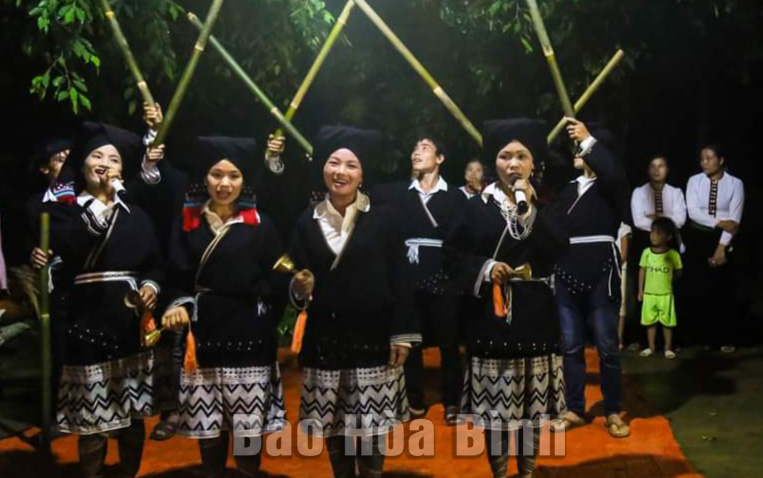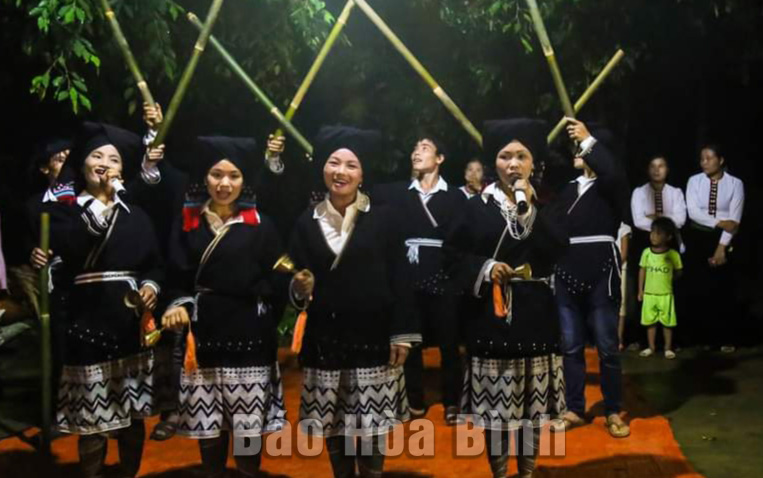
(HBO) - Sung is a highland hamlet in Cao Son commune, Da Bac district, with a natural area of over 780ha. It is endowed with beautiful landscapes, streams and clouds and terraced fields.
A
performance of an art troupe of Sung hamlet in Da Bac district’s Cao Son
commune.
According to local residents, Sung hamlet has existed for 500 years. It
is home to 75 Dao Tien ethnic households, whose lives depend on agricultural
production with rice, maize, and potatoes are main crops.
Since 2017, with the support of Action on Poverty (AOP) in Vietnam, some
households have participated in tourism activities. They obtained loans and
received training relating to cooking and other necessary skills to welcome
tourists.
With the advantage of unspoiled natural beauty, folk dances and the traditional
craft of brocade printing and embroidery which create many valuable products,
Sung hamlet has attracted many domestic and foreign tourists.
Currently, there are three households that offer homestay services, namely
Thanh Chung, Xuan Lan and Nhat Quy homestays, and 50 others who engage in
providing tourism services in the locality. The community guesthouses here are
highly appreciated by visitors for retaining the original architecture of the
traditional houses of the Dao ethnic people.
Households offering homestay services have gradually met the demand of tourists
by serving traditional cuisine, performing traditional music and organising
activities for visitors to experience the lifestyle of Dao ethnic people such
as cooking, fishing and learning how to dye fabric and make brocade embroidery
of the Dao people.
The number of visitors to Sung hamlet was on the rise. In 2017,
the village welcomed 600 tourists, including 450 foreign travelers, and earned
350 million VND (15,040 USD) from tourism-related activities. The figure topped
1,850 in 2019, including 1,590 foreign visitors, with a revenue of 817 million
VND. Between 2020 and 2022, tourism activities will be affected by the COVID-19
pandemic.
Ly Sao Mai, a Da Bac community-based tourism coordinator in Sung hamlet, said
community-based tourism model has created more jobs and increased income for
local people. This is a sustainable business model that exploits the strengths
of locals, while preserving and promoting the natural environment landscape and
national identity.
It does not only have a positive effect on the development of the tourism
sector but also has a profound impact on society, culture, and the environment.
However, the model requires close coordination between local residents, tour
operators and administrations at all levels to maintain its sustainability. It
has initially caught the attention of leaders at all levels and attracted
domestic and foreign tourists./.
A diverse chain of eco-tourism and resort destinations concentrated in Hoa Binh city and the districts of Tan Lac, Da Bac, and Luong Son… Along with the launch of several key high-quality resort tourism projects, these developments have reshaped the landscape and enhanced the appeal of Hoa Binh as a travel destination.
Boasting diverse terrain, a mild climate, and rich natural resources, Cao Phong district is increasingly asserting its place on Vietnam’s tourism map, attracting both domestic and foreign visitors. The district is renowned for its stunning landscapes, majestic mountains, a crystal-clear hydropower lake, and the unique cultural identity of local ethnic groups.
With its pristine landscapes, unique cultural heritage of Muong ethnic minority, and an expanding range of visitor experiences, Tan Lac district of Hoa Binh has fast become a captivating destination for both domestic and international tourists.
Until now, Sung village in Cao Son commune, Da Bac district remains the only Dao ethnic community in Hoa Binh province to develop a community-based tourism model. Beyond its untouched natural landscapes, cultural identity serves as the cornerstone attraction for visitors.
Alongside the diverse cultural identities of the Kinh, Muong, Tay, Thai, Dao, and Mong ethnic people, Hoa Binh province is also renowned as the "capital" of the northwestern Vietnamese cuisine, offering unique and distinctive dishes. At festivals, during Lunar New Year (Tet), or on significant family or community occasions, special dishes are prepared, leaving a lasting impression on visitors.
A Phong Linh (Yellow Tabebuia) flower garden in Thang village, Thach Yen commune, Cao Phong district is currently in full bloom, drawing a large number of visitors.



